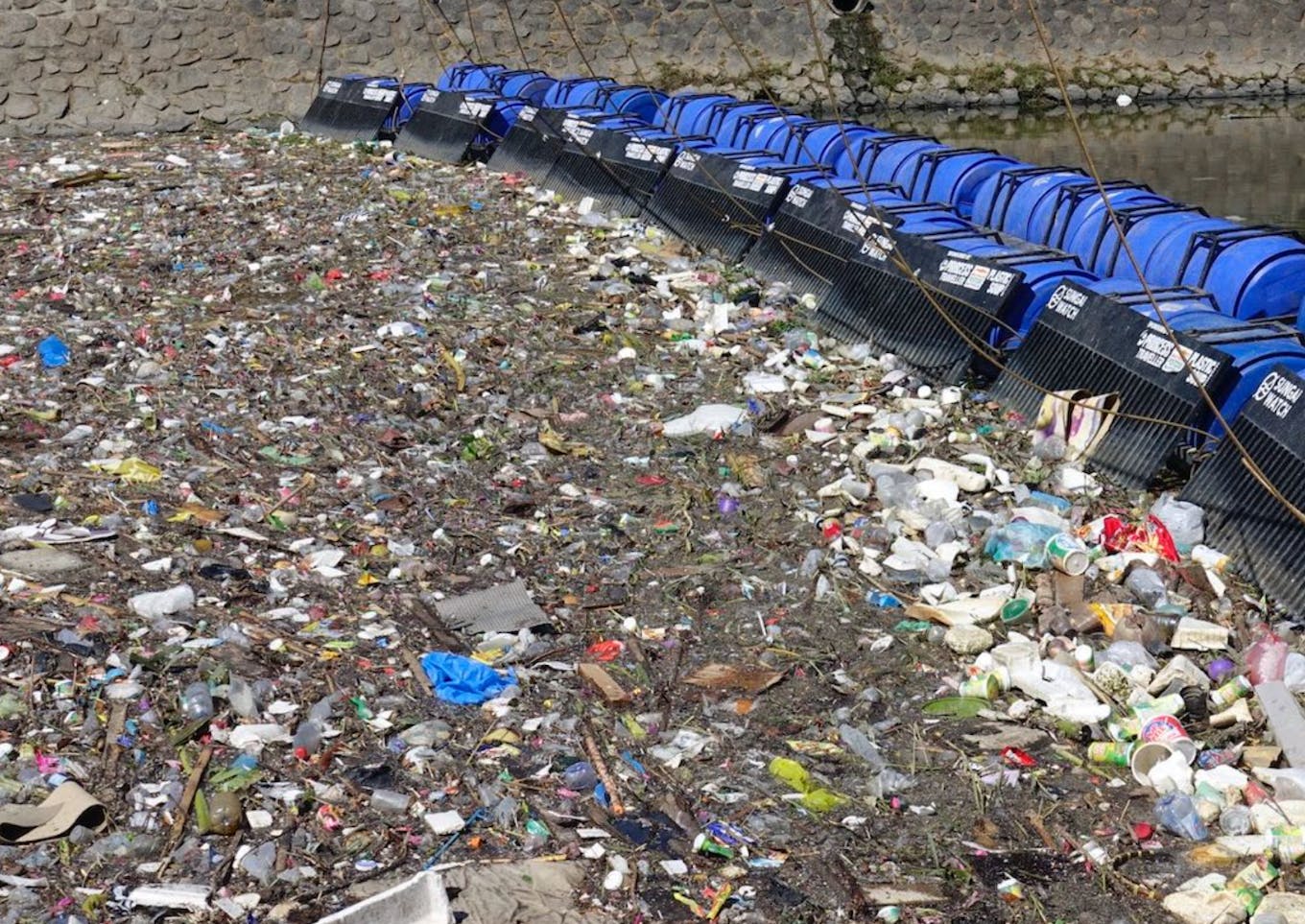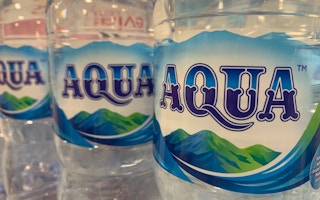Last month, Aqua, a bottled water brand made by French consumer goods firm Danone emerged on top of a ranking of Indonesia’s biggest plastic polluters by Sungai Watch, an environmental non-profit that collects rubbish from rivers in Bali, where it is headquartered, and East Java.
To continue reading, subscribe to Eco‑Business.
There's something for everyone. We offer a range of subscription plans.
- Access our stories and receive our Insights Weekly newsletter with the free EB Member plan.
- Unlock unlimited access to our content and archive with EB Circle.
- Publish your content with EB Premium.
The ranking was not a good look for Aqua, one of Indonesia’s few B Corp-certified companies that prides itself on its sustainability efforts, particularly in plastic waste reduction and supporting the country’s nascent circular economy for plastics.
Karyanto Wibowo, Danone Indonesia’s sustainability director, told Eco-Business that the results of the waste audit results were “not representative” of Indonesia’s waste disposal conditions, since the research only covered areas where Sungai Watch had placed river traps to catch the waste.
He also noted that Aqua-branded bottles only made up a small percentage of the collected trash overall, which mainly consisted of plastic bags, sanitary napkins and diapers. The proportion of Aqua bottles collected had also fallen in recent years – a trend that was not highlighted in the report, Wibowo said.
Danone remains confident that it can hit a sustainability target that would be hard for any company in Indonesia to achieve – to recover more plastics than it uses by next year, 2025.
A number of systemic barriers must first be overcome, Wibowo said, including poor collection and recycling infrastructure, underdeveloped re-use infrastructure, and a lack of recycled material that is “slowing down” the company’s efforts.
In this Q&A, Wibowo outlines the measures Danone is taking to reduce its plastic footprint in Indonesia, the world’s second most pollutive country for plastic waste.
A recent study by Sungai Watch found that one-quarter of all polyethylene terephthalate (PET) bottles discarded into Indonesian rivers are Aqua-branded water bottles and that the company is Indonesia’s top plastic polluter. What is Danone’s response to the findings?
There are several things that we want to highlight with regard to the report. First, the waste audit results were not representative of Indonesia’s waste disposal conditions. This is because Sungai Watch only conducted waste audits in rivers located in a few areas of Bali and Banyuwangi for this research.
If you look at the report, the packaging related to Aqua products – namely PET and polypropylene (PP) – make up just 7 per cent of the total waste collected. Most of the waste is in the form of plastic/flexible plastic bags (20 per cent) and waste materials such as sanitary napkins and diapers (31 per cent) are not specifically published.
Apart from that, packaging that is difficult to recycle, such as multilayer packaging like single-use sachets, does not receive special attention in this report. Unfortunately, Danone has been identified as the biggest polluter.
The report also shows that collected waste from Aqua packaging has decreased compared to last year, indicating that we have made progress in managing post-consumer waste. This progress has not received enough attention.
Why does Danone sell and market plastic products in countries like Indonesia, where there is little to no waste management infrastructure?
There is growing consumer demand for bottled water in Indonesia driven by health concerns. While consumers have chosen the Danone-Aqua brand for quality hydration since 1973 and we are the market leader for bottled water in Indonesia, we are aware of our environmental footprint and are addressing it.
Indonesia’s waste problems are very complex. Indonesia’s Law No. 18 of 2008 focuses on municipal solid waste management and aimed to end all open dump waste disposal by 2013. But until now, Indonesia is struggling to implement that law. Some 61 per cent of plastic waste in Indonesia is uncollected and 70 per cent ends up mismanaged. That law also states that waste management is a shared responsibility of all parties, including individuals, communities, businesses, and the government.
Danone-Aqua has been implementing waste management programmes since 1993. We are working towards 100 per cent circularity by recovering more plastic from the environment than we use by 2025, and increasing the proportion of recycled plastic in our bottles to 50 per cent by 2025. Currently, 70 per cent of our water is delivered in returnable, reusable jugs, which, according to a study by LPEM University of Indonesia, has prevented 770,000 tonnes of virgin plastic from being used.
We also offer a range of products with more sustainable packaging options. For instance, Aqua Life is made entirely from recycled materials and is 100 per cent recyclable. We also offer returnable glass bottles and Aqua Cube, which are small packaging options that are 100 per cent recyclable and do not include straws or labels.
Under the #BijakBerplastik (“Plastic wise”) campaign, which we launched in 2018, we have also developed educational initiatives to integrate waste management into the elementary school curriculum, while our My Waste, My Responsibility (SAMTAKU) educational series provides waste management education to young children.
We recognise that there is still a lot of work to be done, and we remain committed to driving positive change. Putting responsibility only on producers is not wise; waste management efforts will only be successful if carried out collectively, and involve the government and consumers as well as producers.
In 2018, Danone pledged to increase the ratio of recycled plastic it uses to make its bottles to 50 per cent by 2025. How close is the company to achieving this goal?
All Danone-Aqua bottles are 100 per cent recyclable and are currently made of up to 25 per cent recycled PET (rPET). We have committed to eliminating unnecessary single-use plastics such as plastic seals and increasing the proportion of recycled plastic in our bottles to 50 per cent [by 2025] as per plan.
However, we know that voluntary action by individual companies is not enough and can only be one part of the solution. We have observed systemic barriers that must be overcome to achieve a circular economy, including underdeveloped collection and recycling infrastructure, underdeveloped re-use infrastructure, and a scarcity of recycled material that is slowing down our efforts.

A Sungai Watch river barrier in Indonesia. One-quarter of all PET bottles thrown into Indonesian rivers are Aqua-branded. Image: Sungai Watch
Danone has also pledged to remove more plastic from the environment than it uses by 2025. How is this commitment going? According to a recycler in Indonesia, Aqua is looking at options to support waste collection infrastructure, “but at a very limited capacity compared to what the company produces”.
We are working with stakeholders to build an inclusive recycling ecosystem and strengthen waste collection infrastructure in Indonesia. In partnership with Veolia Services Indonesia and Namasindo Plas, we support six recycling centres in South Tangerang, Bali, Bandung, and Lombok, 10 plastic collection centres, and 20 centres for sorting, separating, grouping, and using plastic waste in Indonesia.
We also support a network of community waste banks, and work with almost 8,000 waste collectors across Indonesia. As a result of these efforts, we can now collect up to 22,000 tonnes of plastic waste every year. We are confident of achieving our target to recover more plastics than we use in 2025.
We acknowledge that this is just the beginning of our journey, and we need to increase our efforts to increase collection. However, we believe that our progress is significant, particularly compared to other companies.
How is Danone involved with the development of Indonesia’s Extended Producer Responsibility (EPR) legislation? How does the company believe EPR would work best in Indonesia to reduce plastic pollution?
Danone Indonesia is the founding member of PRAISE [short for Packaging and Recycling Association for Indonesia’s Sustainable Environment, it is an organisation set up in 2020 to ramp up recycling and plastic reduction efforts in Indonesia] together with Coca-Cola Indonesia, Indofood Sukses Makmur, Nestle Indonesia, Tetra Pak Indonesia, and the Unilever Indonesia Foundation. PRAISE aims to create a collaborative waste management system model, or what we call Extended Stakeholders Responsibility, or ESR.
In addition to PRAISE, the Indonesia Packaging Recovery Organization [IPRO, a non-profit linked to PRAISE set up in 2020] aims to increase the collection of used packaging. IPRO is expected to lay the foundations for a structured EPR scheme in Indonesia.
Danone supports a legally binding treaty that covers the full lifecycle of plastics, from production to disposal. What in Danone’s view is key to making the plastic treaty work?
The UN Treaty on Plastics is a historic opportunity to address systemic barriers to plastics circularity, including those linked to collection systems, re-use infrastructure and the availability of recycled material.
We believe the treaty has the potential to align national policies and actions towards a common global strategy for tackling plastic pollution. We call on governments to develop an ambitious treaty that provides the right international policy framework and creates enabling conditions for the necessary investments in infrastructure, innovation, and skills.
This means that countries must agree on a common strategy to reduce the reliance on virgin plastic, adopt harmonised standards for product design and recycling systems, and ensure adequate financing for the transition to a circular economy.
The treaty must include supporting mechanisms for its effective implementation, allowing for the adaptation of solutions that suit local conditions. Without such alignment, the treaty risks being undermined by inconsistent policies and practices.
What is Danone’s position on a global tax on plastic to reduce pollution?
We believe that implementing sound EPR policy has greater potential to reduce packaging waste and plastic pollution than a plastic excise tax. Unlike funds collected from a plastic excise tax, EPR fees are ring-fenced for waste management and recycling. Optimal EPR will apply to all companies that put packaging on the market, creating a level playing field for companies and increasing the total contributed funds.
This interview has been edited for clarity and brevity

















